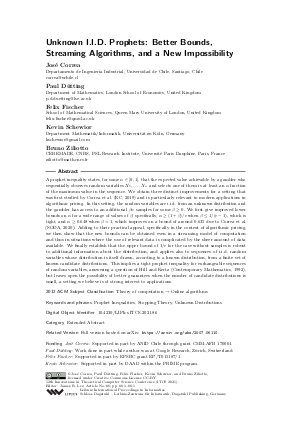Unknown I.I.D. Prophets: Better Bounds, Streaming Algorithms, and a New Impossibility (Extended Abstract)
Authors José Correa, Paul Dütting, Felix Fischer, Kevin Schewior, Bruno Ziliotto
-
Part of:
Volume:
12th Innovations in Theoretical Computer Science Conference (ITCS 2021)
Part of: Series: Leibniz International Proceedings in Informatics (LIPIcs)
Part of: Conference: Innovations in Theoretical Computer Science Conference (ITCS) - License:
 Creative Commons Attribution 3.0 Unported license
Creative Commons Attribution 3.0 Unported license
- Publication Date: 2021-02-04
File

PDF
LIPIcs.ITCS.2021.86.pdf
- Filesize: 226 kB
- 1 pages
Document Identifiers
Related Versions
-
Full version hosted on arXiv: https://arxiv.org/abs/2007.06110.
Subject Classification
ACM Subject Classification
- Theory of computation → Online algorithms
Keywords
- Prophet Inequalities
- Stopping Theory
- Unknown Distributions
Metrics
- Access Statistics
-
Total Accesses (updated on a weekly basis)
0Document
0Metadata
Abstract
A prophet inequality states, for some α ∈ [0,1], that the expected value achievable by a gambler who sequentially observes random variables X_1,… ,X_n and selects one of them is at least an α fraction of the maximum value in the sequence. We obtain three distinct improvements for a setting that was first studied by Correa et al. (EC, 2019) and is particularly relevant to modern applications in algorithmic pricing. In this setting, the random variables are i.i.d. from an unknown distribution and the gambler has access to an additional β n samples for some β ≥ 0. We first give improved lower bounds on α for a wide range of values of β; specifically, α ≥ (1+β)/e when β ≤ 1/(e-1), which is tight, and α ≥ 0.648 when β = 1, which improves on a bound of around 0.635 due to Correa et al. (SODA, 2020). Adding to their practical appeal, specifically in the context of algorithmic pricing, we then show that the new bounds can be obtained even in a streaming model of computation and thus in situations where the use of relevant data is complicated by the sheer amount of data available. We finally establish that the upper bound of 1/e for the case without samples is robust to additional information about the distribution, and applies also to sequences of i.i.d. random variables whose distribution is itself drawn, according to a known distribution, from a finite set of known candidate distributions. This implies a tight prophet inequality for exchangeable sequences of random variables, answering a question of Hill and Kertz (Contemporary Mathematics, 1992), but leaves open the possibility of better guarantees when the number of candidate distributions is small, a setting we believe is of strong interest to applications.
Cite As Get BibTex
José Correa, Paul Dütting, Felix Fischer, Kevin Schewior, and Bruno Ziliotto. Unknown I.I.D. Prophets: Better Bounds, Streaming Algorithms, and a New Impossibility (Extended Abstract). In 12th Innovations in Theoretical Computer Science Conference (ITCS 2021). Leibniz International Proceedings in Informatics (LIPIcs), Volume 185, p. 86:1, Schloss Dagstuhl – Leibniz-Zentrum für Informatik (2021)
https://doi.org/10.4230/LIPIcs.ITCS.2021.86
BibTex
@InProceedings{correa_et_al:LIPIcs.ITCS.2021.86,
author = {Correa, Jos\'{e} and D\"{u}tting, Paul and Fischer, Felix and Schewior, Kevin and Ziliotto, Bruno},
title = {{Unknown I.I.D. Prophets: Better Bounds, Streaming Algorithms, and a New Impossibility}},
booktitle = {12th Innovations in Theoretical Computer Science Conference (ITCS 2021)},
pages = {86:1--86:1},
series = {Leibniz International Proceedings in Informatics (LIPIcs)},
ISBN = {978-3-95977-177-1},
ISSN = {1868-8969},
year = {2021},
volume = {185},
editor = {Lee, James R.},
publisher = {Schloss Dagstuhl -- Leibniz-Zentrum f{\"u}r Informatik},
address = {Dagstuhl, Germany},
URL = {https://drops.dagstuhl.de/entities/document/10.4230/LIPIcs.ITCS.2021.86},
URN = {urn:nbn:de:0030-drops-136255},
doi = {10.4230/LIPIcs.ITCS.2021.86},
annote = {Keywords: Prophet Inequalities, Stopping Theory, Unknown Distributions}
}
Author Details
Funding
- Correa, José: Supported in part by ANID Chile through grant CMM-AFB 170001.
- Dütting, Paul: Work done in part while author was at Google Research, Zürich, Switzerland.
- Fischer, Felix: Supported in part by EPSRC grant EP/T015187/1.
- Schewior, Kevin: Supported in part by DAAD within the PRIME program.
